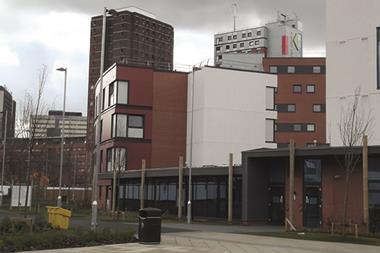Purpose-built student accommodation (PBSA) has experienced unprecedented levels of market activity and investor interest over the past year.

According to JLL, total investment volumes in the sector for 2016 exceeded £3bn, significantly higher than the historical average, with a similar transaction value anticipated during 2017.
Strong market fundamentals and a continued undersupply of beds have caused Knight Frank to upgrade its forecast for the value of the overall sector from £42.3bn today to £50bn by 2020, based on current levels of investment and construction.
Amid this activity, the higher education sector is also evolving. The removal of the cap on student numbers from 2015-16 has changed the way universities recruit students. Expectations are that the mid- to high-tier universities, to which Unite’s portfolio is strategically aligned, will see the biggest growth in student numbers.
UCAS application data published in February showed that the number of applicants continues to comfortably exceed the past supply of university places. For example, 180,000 applicants did not secure a university place last year. Additionally, the introduction of the Higher Education and Research Bill alongside the Teaching Excellence Framework will encourage more competition in the sector as students will be in a stronger position to judge teaching quality and value for money.

These factors have produced growing numbers of students who are dependent on PBSA for affordable, safe and supportive places to live and study. Students are high-dependency occupiers, which we must remember at all times.
Owners of and investors in student accommodation need to think beyond the asset and about the service they are providing. This is defining the sector, not just because it will ultimately promote high occupancy and strong, consistent returns, but because student welfare is a priority.
Elsewhere in the property sector, this is less of a new concept. The office market has been influenced by evolving occupier trends and a greater need for working environments that encourage talent attraction and retention and the wellbeing of employees. Similarly, PBSA is the first residential asset class to truly respond to and focus on day-to-day occupier needs.
Stronger partnerships
At Unite, we have placed a greater focus on service and our operating platform, PRISM, has been central to delivering improvements. It has enabled us to move to a seven-day operating model, offer online room bookings and paperless tenancies, improve maintenance response times and offer fortnightly kitchen cleans. In turn, our partnerships with universities have been strengthened through our care for our students.
The recent acquisition of Aston Student Village is a prime example of how we can add value and enhance the student experience by investing in the accommodation and applying the Unite touch.
Currently, global markets and macro-economic conditions still have an air of uncertainty about them, which inevitably has an impact on future expectations for the property industry and the direction of the higher education sector.
Set in this context, operators need to have the capabilities and strong partnerships in place to add the most value for students and universities. Across the wider sector, as occupier decisions are increasingly driven by service, property firms and investors need to think beyond just the four walls.






























No comments yet